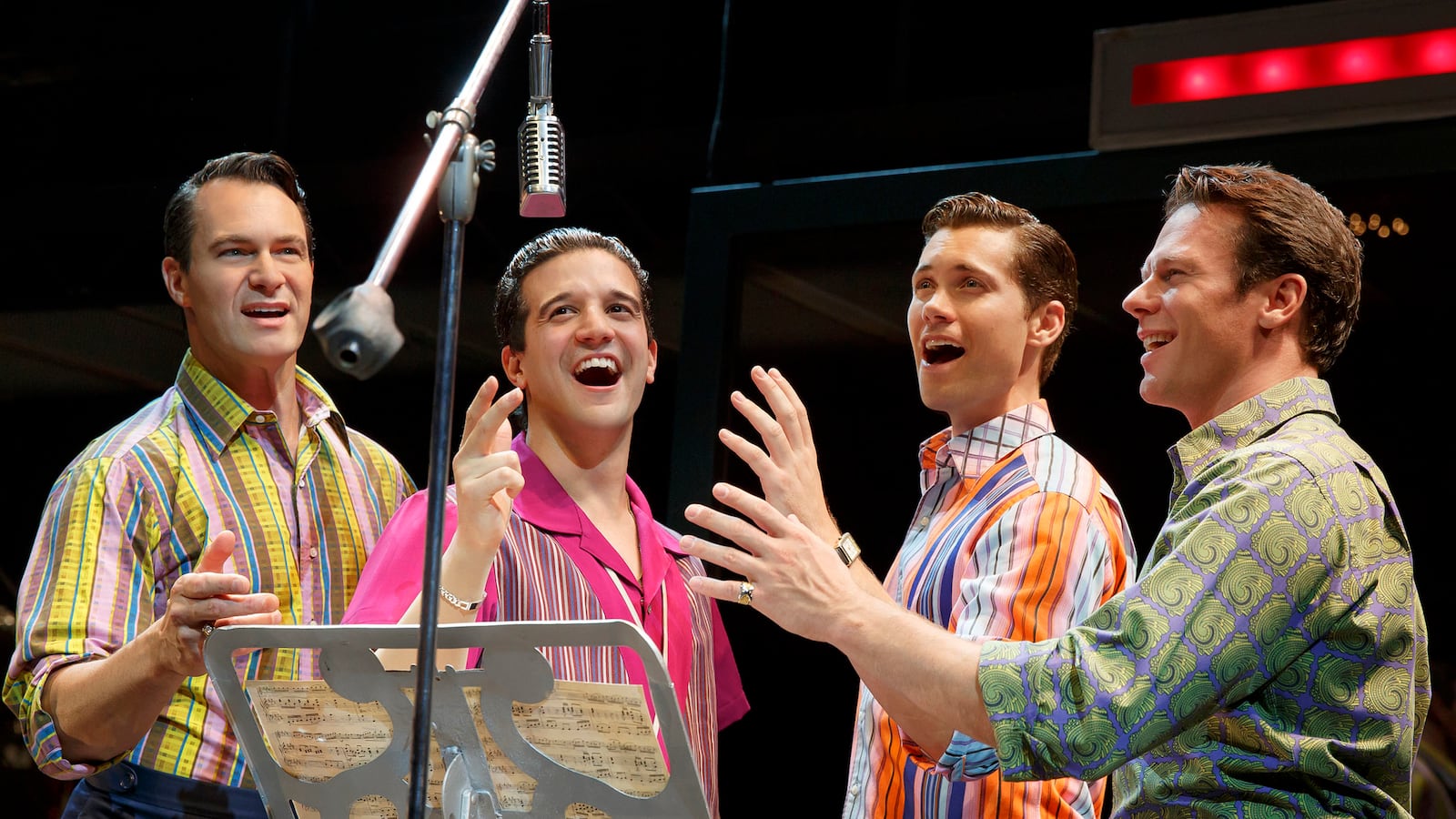I’ve never had any real desire to see the Broadway musical Jersey Boys, based on the story of the band the Four Seasons. I assumed the musical would simply regurgitate their best hits peppering in sparse dialogue and the occasional jazz hands. Perhaps one for tourists, or for fans of the band. But for anyone else? Really?
To put my light familiarity with the Four Seasons in perspective, my most vivid memory of their music was hearing Heath Ledger gloriously sing “Can’t Take My Eyes Off of You” in a pinnacle romantic scene in 10 Things I Hate About You.
Due to dwindling ticket sales, Jersey Boys has to close its curtains mid-January. This news came as a surprise considering it’s the 12th longest running show on Broadway. I was curious to discover what led so many theatregoers to see it.
The real Four Seasons were legendary musicians who cultivated a unique sound. They focused on harmonizing their high-pitched falsettos while looking dapper in revolving glitzy suits. Behind all the glamour, there was tension which eventually caused two original bandmates to leave. The musical shows snapshots of the band’s rise and fall in the music industry, while weaving their original music into the storyline.
According to Page Six, Jersey Boys has grossed more than $2 billion internationally, while scooping four Tony Awards since its debut in 2005.
Despite its box ticket success, the response from critics was not positive. The New York Times said it passed “as silver instead of as the chrome-plated jukebox that it is,” while Variety said, “the book is clunky, the backstory is emotionally skeletal and the structure sticks to a generic ‘VH1 Behind the Music’ model.”
The night I saw Jersey Boys, the theater was full. The audience—which seemed like a sea of expensive furs and fitted suits reminiscent of the ’60s—sat impatiently waiting for a first glimpse of the actors playing their beloved Four Seasons.
The opening act commenced without the Jersey Boys themselves. In lieu, a group of supporting actors performed French rapper Yannick’s adaptation of an “Oh What a Night” (“Ces soirées-là”), an original Four Seasons song. They donned big hair, knee high pastel boots, and paisley prints, while jiving up and down the two-floor, scaffolding heavy stage.
Before this performance could end, the Four Seasons actors walked out singing “Silhouettes.” It’s a song originally written for the band The Rays, which the real Four Seasons covered in 1963. Initially, it seemed ironic that the very first song was not an original Four Seasons hit, but consider that the song’s title means the outline of a real object—perhaps director Des McAnuff is making a statement about imitation, this ambiguous beginning shows that the musical is an interpretation of the real Four Seasons’ story, and not an authentic, by the book, rehashing of their career.
When it comes to the musical, it doesn’t matter if actor Mark Ballas sounds like the real Frankie Valli or that Mark Bogart nailed Nick Massi’s Jersey accent. Per McAnuff’s direction, the Broadway performers transcend the sense they are imitating anything, and instead produce something wholly original.
The most intriguing aspect of the musical is how seamlessly the music selection, witty script, and set design work together to create a fast and organic flow to the narrative and music.
Though the structure of the musical is intricate, the actual premise of the story is not, hinging on the notion of achieving the American dream.
In the musical, we see thug Tommy DeVito (Nicolas Dromard) relentlessly dreaming and working to create a successful band. He enlists bassist Nick Massi, lead falsetto singer Frankie Valli and songwriter Bob Gaudio (Drew Seeley) to follow his lead.
Despite their unique sound, the band quickly realizes that it will take a lot more than banging on doors to get their record played on the radio and into the charts.
In Act 1 of Jersey Boys, they play countless empty dive bars and travel cross-country doing whatever it takes to succeed. Eventually, they land their first hit, “Sherry,” on the radio, ending their dry spell of endless rejections, and paving a path to stardom.
In Act 2, we see cracks forming in their relationship. When Tommy gambles everything he has and doesn’t have, the band assumes his debt, but they also kick him out of the group. Fame not only changes the dynamic of the band, but also affects each individual performer differently, as they grow irritable and reckless. Frankie cheats on his wife, landing him a pricey divorce. Nick Massi grows weary of life on the road and leaves the band on his own volition.
Jersey Boys is essentially a dramedy capturing the thrill of achieving a goal and the pitfalls that come with it through comedic monologues and melancholic ballads. It is not without thematic clichés, filled with witty one-liners and exaggerated accents, and allusions to Jersey men being painstakingly loyal to their family and friends, or hot-headed, or mafia prone.
However, the chemistry between the cast is undeniable. Throughout the 2.5-hour musical, they harmonized beautifully, and meticulously synchronized each dance step choreographed by Sergio Trujillo. I’m sure it didn’t hurt to have Ballas, former Dancing with the Stars alum, on set for tips.
McAnuff pulls off a complicated narrative, considering his difficult task of showing the entirety of the Four Seasons career in just two acts. He successfully maintains a high-energy vibe throughout the musical. Hit songs like “Walk Like a Man” or “Big Girls Don’t Cry” don’t last more than a couple minutes. The monologues are short, punchline-heavy, wry, and serve as complete synopses of where each character ultimately ends up.
After seeing the show, my cynicism evaporated. I can understand why 24 million people have seen Jersey Boys internationally. It’s gloriously entertaining; I know for sure that I’ll never fuhgeddaboudit.
Jersey Boys is at the August Wilson Theatre, 245 West 52nd Street, through Jan. 15. Book tickets here.






